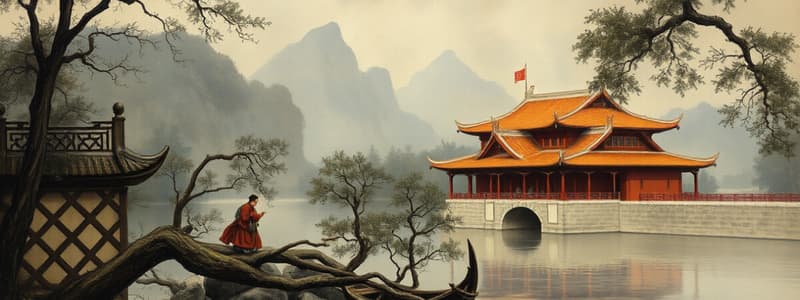Podcast
Questions and Answers
What was the last imperial dynasty of China?
What was the last imperial dynasty of China?
- Qing Dynasty (correct)
- Han Dynasty
- Ming Dynasty
- Tang Dynasty
Who founded the Qing Dynasty?
Who founded the Qing Dynasty?
Manchus
When did the Mughal Empire exist?
When did the Mughal Empire exist?
- 1700-1900
- 1400-1500
- 1600-1700
- 1526-1857 (correct)
What language did the Ottoman Empire primarily speak?
What language did the Ottoman Empire primarily speak?
What system did the Ottomans use to recruit elite soldiers from Christian communities?
What system did the Ottomans use to recruit elite soldiers from Christian communities?
What is the term for the idea that monarchs are God's representatives on earth?
What is the term for the idea that monarchs are God's representatives on earth?
The __________ was a famous mausoleum built by the Mughal emperor Shah Jahan.
The __________ was a famous mausoleum built by the Mughal emperor Shah Jahan.
Who initiated the Protestant Reformation?
Who initiated the Protestant Reformation?
The Thirty Years War was fought primarily for economic reasons.
The Thirty Years War was fought primarily for economic reasons.
What doctrine did John Calvin develop?
What doctrine did John Calvin develop?
What is the term for the taxation system used by the Mughal Empire?
What is the term for the taxation system used by the Mughal Empire?
What was the main purpose of the Jesuits?
What was the main purpose of the Jesuits?
Match the following terms with their definitions:
Match the following terms with their definitions:
What was the Millet System used for by the Ottomans?
What was the Millet System used for by the Ottomans?
Flashcards are hidden until you start studying
Study Notes
Qing Dynasty
- Last imperial dynasty of China, ruling from 1644 to 1912.
- Founded by the Manchus, succeeding the Ming Dynasty.
- Expanded borders to include Taiwan, Tibet, Central Asia, and Mongolia.
Manchus
- Northeast Asian ethnic group that established the Qing Dynasty.
- Defeated the Ming Dynasty in 1644.
Mughal Empire
- Dominant Muslim state in India from 1526 to 1857.
- Managed a vast and diverse empire with various challenges.
Ottoman Empire
- Lasted from 1453 to 1922, founded by Turkic-speaking peoples.
- Conquered the Byzantine Empire in 1453, establishing Istanbul as its capital.
- Territorial expanse included the Middle East, North Africa, Caucasus, and Eastern Europe.
Safavids
- Shi'ite Muslim dynasty in Persia from the 16th to 18th centuries.
- Created a mixed culture influenced by Persians, Ottomans, and Arabs.
Songhai
- Islamic empire in West Africa that conquered Mali, thriving until the 16th century.
- Ultimately defeated by Moroccans following conflicts with Portugal.
Devshirme
- Turkish term meaning 'selection'; an Ottoman system for recruiting boys from Christian families.
- Boys trained as Janissaries, elite soldiers and administrators in the empire.
Janissary
- Elite foot soldiers or administrators in the Ottoman Empire.
- Recruited through the devshirme system; converted to Islam and trained in gunpowder weaponry.
Samurai
- Class of salaried warriors in feudal Japan, loyal to daimyos.
- Daimyos pledged loyalty to the shogun in exchange for land or rice.
Divine Right
- Concept that monarchs are God's representatives on earth, accountable only to God.
Absolute Monarchy
- Government system where the monarch holds nearly complete power, hereditary in nature.
Versailles
- Palace built by Louis XIV near Paris, serving as a symbol of his rule and control over the nobility.
- Constructed in the late 17th to early 18th century.
Zamindars
- Taxation system in the Mughal Empire where decentralized lords collected taxes for the emperor.
Taj Mahal
- Monumental mausoleum built by Mughal emperor Shah Jahan in Agra for his wife.
- Completed in 1649, showcasing a blend of Indian and Arabic architecture.
Tax Farming
- Ottoman practice of hiring private individuals for tax collection to finance empire expansion.
Protestant Reformation
- Social and religious movement initiated by Martin Luther in 1519 questioning Catholic Church practices.
- Led to the formation of various Christian denominations, including Lutheran and Anglican.
95 Theses
- Martin Luther's criticisms of the Catholic Church, published on October 31, 1517.
- Catalyst for his excommunication and the Protestant Reformation.
Martin Luther
- German monk and key figure in the Protestant Reformation.
- Authored the 95 Theses, challenging church practices and teachings.
Counter/Catholic Reformation
- Roman Catholic Church's response to Protestant Reformation.
- Reinforced papal authority, curtailed indulgences, created Jesuit missionaries, and initiated the Inquisition.
Jesuits
- Society of Jesus, a Catholic missionary order established during the Counter Reformation.
- Focused on spreading Catholicism in regions like China, Japan, and the Americas.
Indulgence
- Church-issued pardon reducing punishment for sins, requiring repentance and monetary payment.
Simony
- Corrupt practice of buying and selling church offices, abolished during the Counter Reformation.
Inquisition
- Tribunal established by the Catholic Church for investigating heresy, a reaction to the Protestant Reformation.
Thirty Years War
- Devastating conflict (1618-1648) in the Holy Roman Empire, between Protestant and Catholic forces.
- Ended with the Treaty of Westphalia, reshaping European political boundaries.
John Calvin
- French theologian (1509-1564) who established Calvinism.
- Promoted beliefs in predestination and attracted numerous Protestant followers.
Sikhism
- Monotheistic religion emerging in 16th-century India, founded by Guru Nanak.
- Combined elements of Hinduism and Islam.
Shogunate
- Japanese rule under a shogun, who held real power; the emperor served as a symbolic figurehead.
Daimyo
- Feudal lords in Japan commanding private armies of samurai, pledging loyalty to the shogun.
Jizya
- Tax imposed on non-Muslims (Christians and Jews) in Muslim territories, allowing religious practice.
Millet System
- Ottoman system for managing diverse religious communities, granting autonomy to different millets under their religious leaders.
Studying That Suits You
Use AI to generate personalized quizzes and flashcards to suit your learning preferences.




